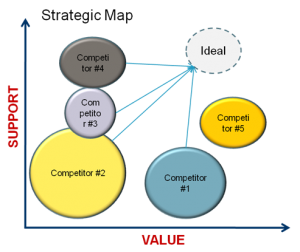 It took you years of hard work to reach the corner office.
It took you years of hard work to reach the corner office.
You worked through multiple assignments to deliver results and overcome challenges. At each career step, your responsibilities increased and so did the expectations. More and more people looked to you to set the strategies and determine the directions to follow.
Now, after all that time, the entire company is yours to lead. You have arrived.
Others look at you and think that you have the most latitude because of your high position. If they only knew the truth. So many things constrain and concern you. The employees look to you for leadership and countless decisions about priorities, promotions and their own job security. Customers constantly want more and on better terms than before. Investors want the share price to increase and their investments to pay off. Analysts want above average growth and a story about ongoing differentiation. Meanwhile, your many competitors only want you to fail and are doing their best to make that happen.
Somehow, you have to orchestrate this complex combination of constituencies and competitors.
There is not one answer to this balancing act. You naturally will integrate inputs from your team and the environment to settle on what seems best. One source of inputs is competitive intelligence. Competitive Intelligence can help you to organize your external perspectives and align your team to compete better. Here are five ways.
 Everyone else is working on the current products and the near-term tasks. Meanwhile, you are responsible for what comes next. Your focus is the next wave of products and the technologies that they require. You are monitoring key standards bodies, investments made by competitors and shifting loyalties of the key customers. There is pressure to make sure that the company is preparing correctly for this future. Your job depends on making the right calls and convincing busy people that you are right.
Everyone else is working on the current products and the near-term tasks. Meanwhile, you are responsible for what comes next. Your focus is the next wave of products and the technologies that they require. You are monitoring key standards bodies, investments made by competitors and shifting loyalties of the key customers. There is pressure to make sure that the company is preparing correctly for this future. Your job depends on making the right calls and convincing busy people that you are right. You are a busy person and taking time to read this is a significant investment for you.
You are a busy person and taking time to read this is a significant investment for you.
 It probably wasn’t until I spent time in Malindi, Kenya, that I got a visceral sense of what it meant to be in the minority. My skin was far lighter, my hair was different and my clothes seemed out of place. I was a “mzungu” (white person). The people were quite kind yet I knew that most of the social adaptations would have to come from me. For a relatively brief time I felt what minorities must feel all the time when they live permanently with people different from themselves.
It probably wasn’t until I spent time in Malindi, Kenya, that I got a visceral sense of what it meant to be in the minority. My skin was far lighter, my hair was different and my clothes seemed out of place. I was a “mzungu” (white person). The people were quite kind yet I knew that most of the social adaptations would have to come from me. For a relatively brief time I felt what minorities must feel all the time when they live permanently with people different from themselves.